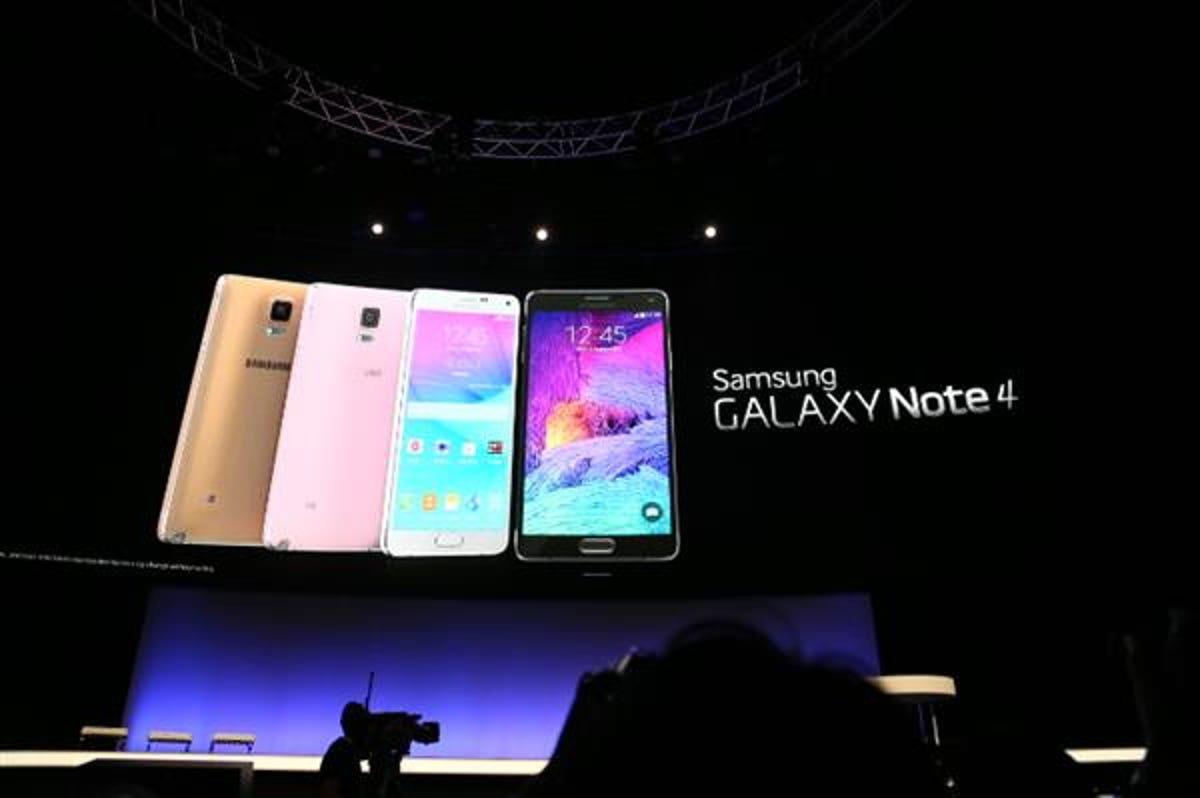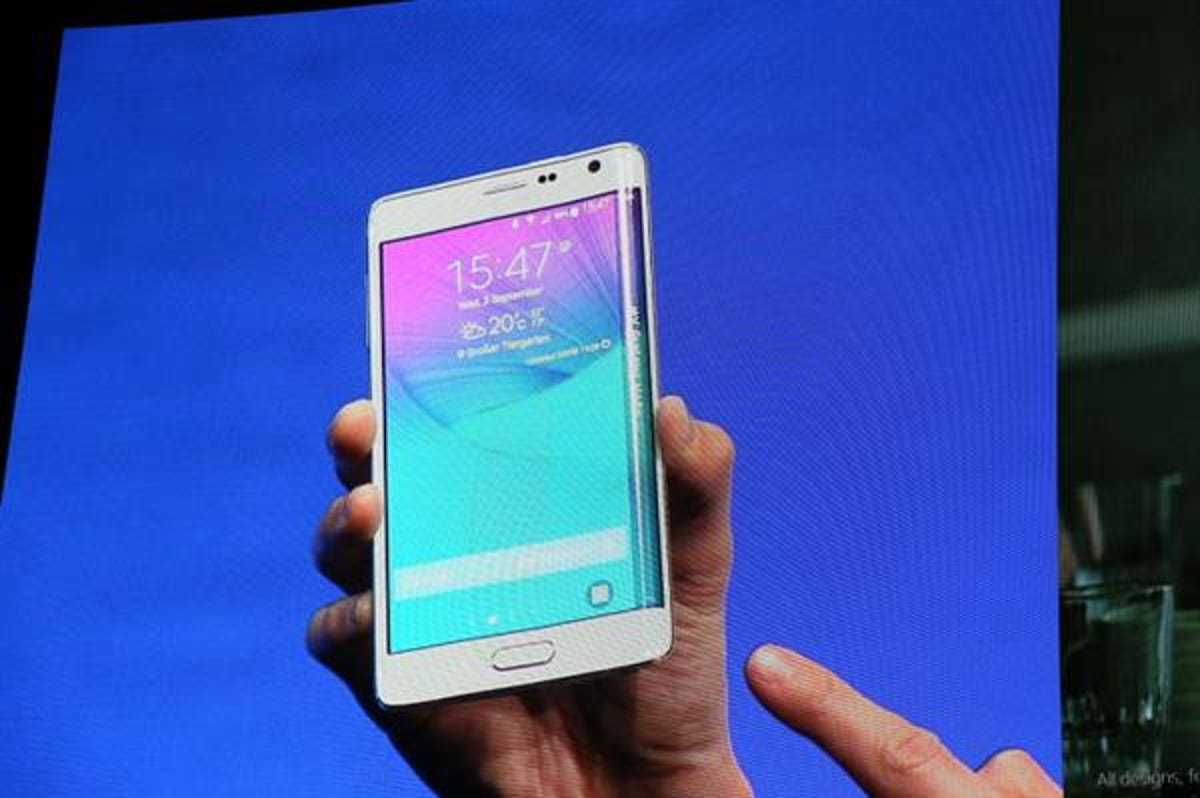
CNET
Samsung on Wednesday unveiled the new Galaxy Note 4 , updating one of its marquee smartphone lines at a time when the Korean tech giant could well face stiffer competition in bigger-screen phones.
The company also introduced the Note Edge smartphone, featuring a distinctive curved display, and the Samsung Gear VR virtual-reality headset, developed with Facebook’s Oculus.
RELATED STORIES
- Samsung Galaxy Note 4 has quad HD 5.7-inch display, 16MP camera, faster Snapdragon 805 chip (hands-on)
- Wacky, shapely Samsung Galaxy Note Edge sports curved, fallaway 5.6-inch screen (hands-on)
- Samsung Gear VR is real: Samsung plus Oculus turns a Note 4 into virtual reality (hands-on)
- Samsung Gear S: Massive curved screen, 3G and Wi-Fi, too (hands-on)
- Why Galaxy Note 4 is a must-win for Samsung. Hint: Big-screen iPhone
Wednesday’s event, dubbed “Unpacked” by Samsung and held at the IFA trade show in Berlin, comes at an uncertain moment for Samsung. The company is being pressured in emerging markets by low-cost handset vendors such as Xiaomi and Huawei. It’s also facing tough competition from Apple in the market for pricey, high-end smartphones.
Samsung, which started its bigger-screen, stylus-welding Note line in 2011, opted to double-down on these smartphones, now offering two new versions, the Note 4 with a 5.7-inch display and the Note Edge with a 5.6-inch display. Although usually a second fiddle to Samsung’s Galaxy S line of phones, the Note devices could help Samsung keep ahead of Apple, which is expected to come out with its own bigger-screen iPhone smartphones next week, including one with a 5.5-inch display. Those Apple devices could threaten Samsung’s strength in jumbo smartphones, a market Samsung essentially created and one in which the Note has enjoyed a lack of opposition.
With simultaneous events in New York, Berlin and Beijing, Samsung’s unveilings went along essentially as expected, focusing on the newest Galaxy Notes, as well as the new virtual reality headset, and the Gear S smartwatch . Samsung announced the Gear S last week, ahead of its Unpacked event.
New Samsung gadgets you’ll want: Galaxy Note 4, Note Edge, Gear S, Gear VR. (pictures)






+25 more
DJ Lee, head of sales and marketing for the IT and mobile communications division of Samsung Electronics, said at the Wednesday event in Berlin that his company sees the smartphone as progressively becoming more of a “hub of human interaction,” being a mobile wallet, personal television, computer for work and health coach.
He said Samsung plans to push forward efforts to have users adopt such uses by innovating smartphone technology. “I can promise you that we will never slow down,” he said.
The Note 4 incorporates Samsung’s first 1440p display and a quad-core Snapdragon 805 chipset, but also marks the first time Samsung hasn’t boosted the size for its jumbo phone, keeping with the Note 3’s 5.7-inch display size. The Note 4, which will go on sale globally in October, arrives as more consumers are willing to tolerate the bulkiness of a larger display for an improved video, gaming and Internet-browsing experience. Interest in the product is high. And the company badly needs a hit after the disappointing sales of the 5.1-inch Galaxy S5 and mounting competition in the market.


CNET
For the Note Edge, Samsung created a touchscreen that bends along the right edge of the smartphone, offering users a curved and independent screen for app shortcuts, notifications, and controls for the camera and video playback.
Samsung also showed off the Gear VR, a virtual-reality headset that uses the company’s new Galaxy Note 4 as its main display. The headset, developed in conjunction with Oculus VR, offers 360-degree viewing of 3D videos and will go up against other virtual-reality efforts including Project Morpheus from Sony and Google’s VR projects.
While Samsung often gets knocked as a “fast follower” when it comes to tech trends, it’s indisputable that the company blazed a new trail with the introduction of the original 5.3-inch Galaxy Note in 2011. Though the device was mocked at first for its large display, that display size gradually found acceptance among consumers. There was a grudging acceptance of the Note 2 in the market and eager anticipation for the Note 3. It also set off a stream of similar big-screen devices from rival handset vendors such as HTC and LG.
So-called phablets, typically defined as having screens between 5 and 6.99 inches, still make up a small percentage of the overall smartphone industry’s sales. Only 15 percent of smartphones sold worldwide last year were phablets, according to Strategy Analytics. This year, the phablet share should rise to 22 percent, boosted by the new devices expected from Apple, Strategy Analytics analyst Neil Mawston said.



